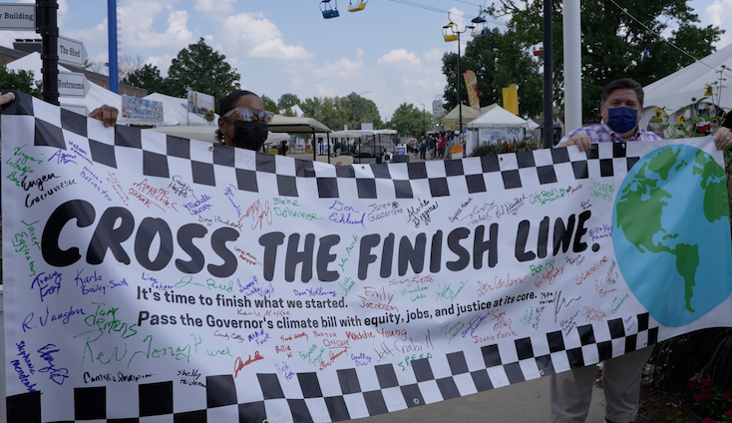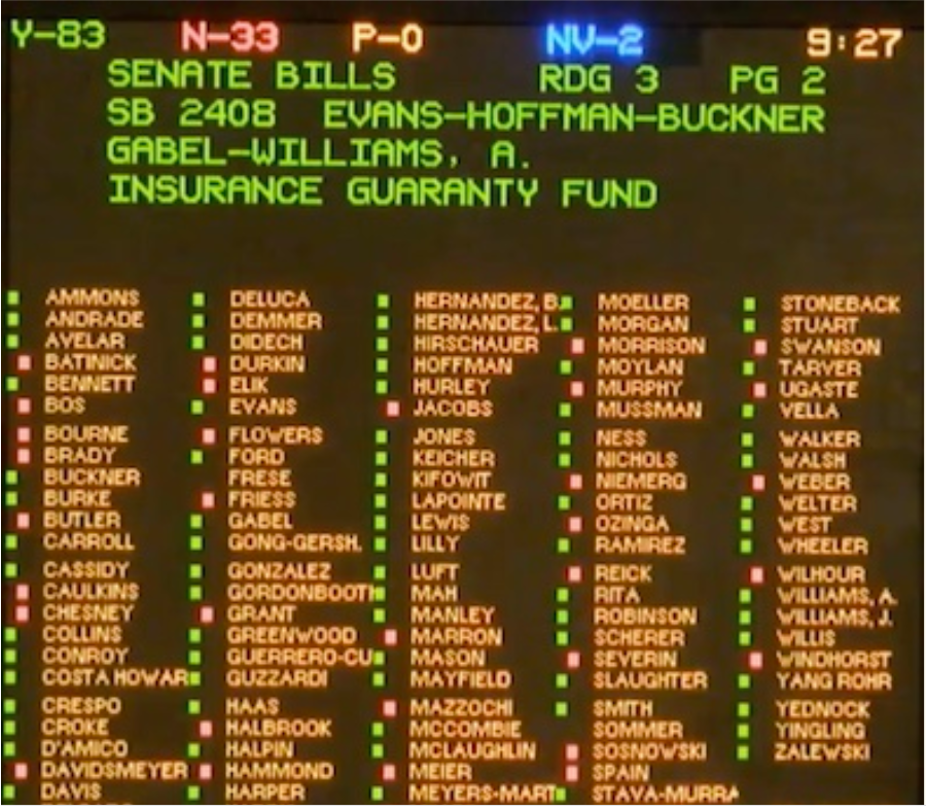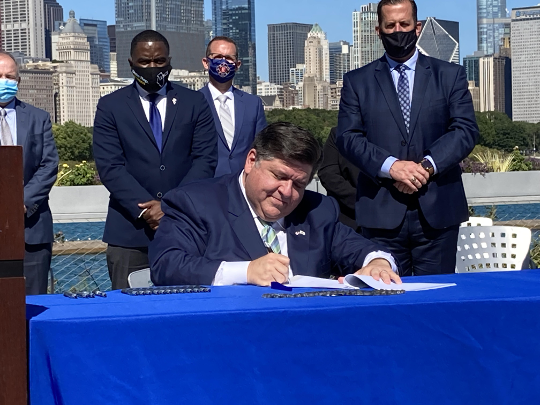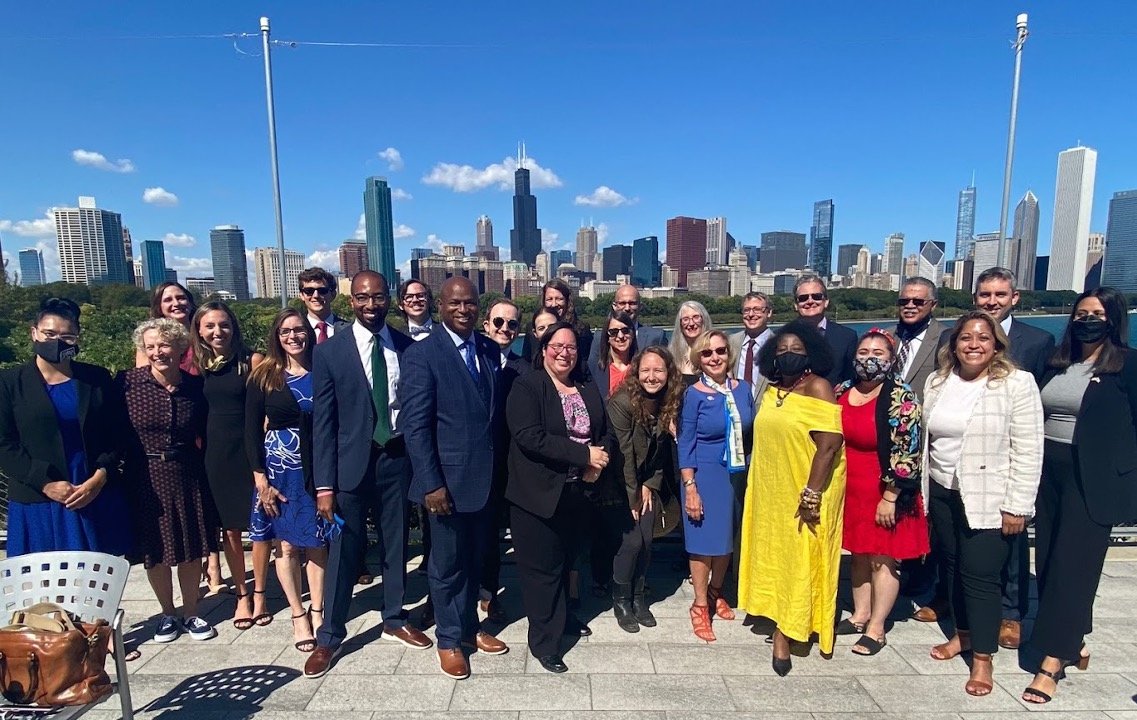Three Lessons from Organizers Who Fought for Illinois’ Climate Equitable Jobs Act
By Jillian Du and Avery Kaplan
In September 2021, Illinois passed one of the most equitable clean energy jobs bills in history. The Illinois Climate & Equitable Jobs Act (CEJA) moves a whopping $380 million per year for renewable energy and zero-emission vehicles, $82 million per year to clean energy workforce development, and $41 million per year to former fossil fuel communities for a just transition. And if that’s not enough, CEJA also states that 40% of benefits and investment in renewable energy must target frontline communities.
What makes CEJA monumental is not just the numbers, but the people power behind it. Building on experience with Illinois’ 2017 Future Energy Jobs Act (FEJA), CEJA could not have happened without decades of grassroots organizing and power building by environmental, racial, and economic justice groups. These leaders not only shaped the policy but held their elected officials accountable for passing progressive climate legislation.
After the landmark legislative win, organizers face a new set of challenges as they fight for the spirit of CEJA to become reality through the implementation process. We heard from three organizers directly involved in the campaign that championed CEJA – Dawn Dannenberg (Illinois People’s Action), Naomi Davis (Blacks in Green), and Kentaro Kumanomido (United Congregations of Metro East) – on their top lessons learned:
1. It is not enough to be right
“Instead of just focusing on writing the right bill, they asked themselves, how can we build power so the bill can actually become reality?”
The coalition’s experience with FEJA in 2017 highlighted this valuable lesson. A cohort of almost 60 groups came together to design an air-tight bill with the right language, but important components were still negotiated away. Dannenbring recounts, “In the end, we did not get what we wanted. NEM (net energy metering) was negotiated away, equity measures were lost, we did not get as much money as we needed.”
To prevent this for next time, the organizers knew they needed to zero in on a more effective powerbuilding strategy. Instead of just focusing on writing the “right” bill, they asked themselves, how can we build power so the bill can actually become reality? Kumanomido describes, “It was important to shift power so that crafting policy is not just in the hands of [investor-owned] utilities.”
2. You can only win what you have enough power to compel, and you always need more power
To build power, they focused on deep engagement tactics to foster community buy-in. The coalition organized over 100 listening sessions over two years. These sessions directly informed the next iteration of the bill (what eventually became CEJA) and efforts to engage key legislators.
This time, they were determined to hold strong on equity measures, a task that did not come without obstacles. The bill stalled multiple times in 2020 and 2021. Tension arose between policy professionals and on-the-ground organizers. Organized labor groups also raised their own concerns around job provisions. “The coalition brought together organizers, advocates, and policy experts,” Dannenbring recounts, “We don’t all speak the same language.”
But when you have enough people power, you can win. The coalition agreed to stick together on their position: “no climate, no equity, no bill.” Yet, they still needed to find a way to pressure the governor without putting him off. With a unified position, organizations took turns hosting rallies, actions, and events. The effort paid off. As police moved to shut down the final rally in support of the bill, Dannenbring recalls, “the governor came around the corner and said ‘They’re with me! No climate, no equity, no bill!’”
The next day, the state senate passed the CEJA bill, per the governor’s strong recommendation.




3. The bill you write will never be implemented stronger than you write it
It quickly became clear that implementation is a whole challenge of its own. Davis of Blacks in Green remembers, “I was shocked that there was a whole new beginning waiting for us, and it was called implementation. After CEJA passed, it seemed like a never-ending queue of organizations wanted a piece.”
Moreover, over ten agencies are responsible for different parts of implementation, but they seldom coordinate with each other effectively. And it continues to be challenging for frontline groups to even access, let alone influence, decision-making channels. “Even in the ways that are provided, such as commenting, we have no guarantee that our comments will even be considered,” says Davis. “Access was deeply constricted.”
“CEJA was always a disruptive bill,” says Dannenbring. “It was designed to let people who have never been involved in a tech or energy revolution finally call the shots.”
A key way to confront this power imbalance is to build a pool of technical allies, according to Davis. Technical allies – those already in legal, technical, and industry spaces – should lead in their spheres of influence, but follow the solutions in the interest of those most impacted.
“CEJA was always a disruptive bill,” says Dannenbring. “It was designed to let people who have never been involved in a tech or energy revolution finally call the shots.”
These lessons from CEJA are timely as more state governments are compelled to pass climate bills, and as implementation of the Inflation Reduction Act gets underway. Climate policy that is written and implemented by the people, for the people, is key to an equitable, clean energy future.
If you want to learn more about how the strategies and lessons from CEJA can translate to your state, Dawn, Naomi and Kentaro welcome you to reach out! Email policy@theequityfund.org to get connected.
Jillian Du is a research and engagement strategist at the Equity Fund. Avery Kaplan is an operations assistant at the Equity Fund.

